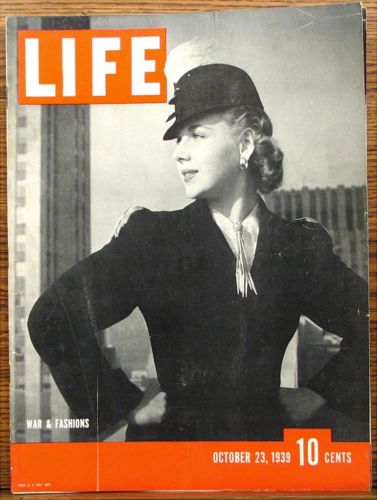Monday 23 October 1939
 |
| The SS City of Flint. |
The local Soviet authorities are confused by the American ship flying a German flag and at first, imprison the German crew and give The City of Flint back to the detained American Captain. They then have second thoughts and decide to maintain the status quo in the interest of friendly relations with the Third Reich. However, the situation is still fluid and no final decisions have been made by Moscow, which must consider its relations with the United States as well.
German freighter Bianca captured in the Atlantic by Royal Navy armed merchant cruiser Transylvania.
German tanker Emmy Friedrich scuttled in the Caribbean to avoid capture.
The British detain the US freighter Tulsa.
Convoy OA 24G departs from Scotland, and SL 6 departs from Freetown for Liverpool.
Western Front: German demonstration attacks in the Saar. The weather is turning, the days are growing shorter, and activity is light. It is not good campaigning weather.
French Prime Minister Édouard Daladier relaxes the tense state of military preparation due to the growing likelihood that it will be a quiet winter. He authorizes eight to ten days' leave every four months for the military. He also eases blackout regulations.
Norway: The British Home Fleet protects a convoy from Narvik carrying iron ore. Such iron ore is coveted by both sides.
Attention is turning to Norway on both sides of the conflict. Admiral Raeder already has suggested that Norway would provide excellent U-boat bases. There also are large nickel deposits in the north near Murmansk, along with the Narvik iron ore. Sweden controls the rail line from Narvik after which it would have to be loaded on ships anyway, so shipping the ore down the Norwegian coast whilst avoiding Swedish interference completely is highly valued. It is Norway's geographic location and natural resources that make it extremely attractive to nearby large powers.
Norway, for its part, knows all too well how important it would be as an asset to both sides. Aircraft and vessels from the warring parties have been violating its neutrality routinely. It is remaining studiously neutral - though one can detect hints here and there of favoritism to the Allies, albeit under heavy political pressure from them due to its own reliance on sea supply lines. However, there are influential forces in Norway that are adamantly pro-German or at least not pro-Ally.
Finland: The Finnish delegation led by Foreign Minister Paasikivi and the Minister of Finance, Tanner, arrives back in Moscow.
American Homefront: Gallup continues polling the public. Previously, it found that 95% opposed American involvement in the European war. This time it asks which side the respondent wishes to see win. The results:
- The Allies: 84%
- Germany: 2%
- No Opinion: 14%.
- Yes 62%
- No 38%
The James Cagney/Humphrey Bogart movie "The Roaring Twenties" opens. It is a retrospective about the end of the First World War and how disaffected soldiers turned to crime. "The Roaring Twenties" is the only time that Humphrey Bogart and James Cagney star together. The timing of the release is excellent because late 1939 is a good time for summing up the past as international events appear to be lurching in radical new directions. The movie is an instant classic.
 |
| The war already is affecting fashion. Life Magazine, 23 October 1939. |
October 1939
October 1, 1939: Occupation of WarsawOctober 2, 1939: Hel Peninsula Falls
October 3, 1939: The Diamantis Incident
October 4, 1939: Otto Kretschmer Gets Rolling
October 5, 1939: Polish Resistance Ends
October 6, 1939: Hitler Peace Effort
October 7, 1939: The British Have Arrived
October 8, 1939: First RAF Kill from UK
October 9, 1939: "City of Flint" Incident
October 10, 1939: Lithuania Under Pressure
October 11, 1939: The Atomic Age Begins
October 12, 1939: England Rejects Hitler's Peace Offer
October 13, 1939: Charles Lindbergh Speaks Out
October 14 1939: Royal Oak Sunk
October 15, 1939: Cuban Rockets
October 16, 1939: First Aircraft Shot Down Over UK
October 17, 1939: Marshall Mannerheim Returns
October 18, 1939: Prien Receives His Award
October 19, 1939: Preliminary Plan for Fall Gelb
October 20, 1939: Hitler Grapples with the Jews
October 21, 1939: Hurricanes to the Rescue!
October 22, 1939: Goebbels Lies Through His Teeth
October 23, 1939: Norway the Center of Attention
October 24, 1939: German "Justice" Gets Rolling
October 25, 1939: Handley Page Halifax Bomber First Flies
October 26, 1939: Jozef Tiso Takes Slovakia
October 27, 1939: King Leopold Stands Firm
October 28, 1939 - First Luftwaffe Raid on Great Britain
October 29, 1939: Tinkering with Fall Gelb
October 30, 1939: Defective Torpedoes
October 31, 1939: Molotov Issues an Ultimatum
2019
No comments:
Post a Comment